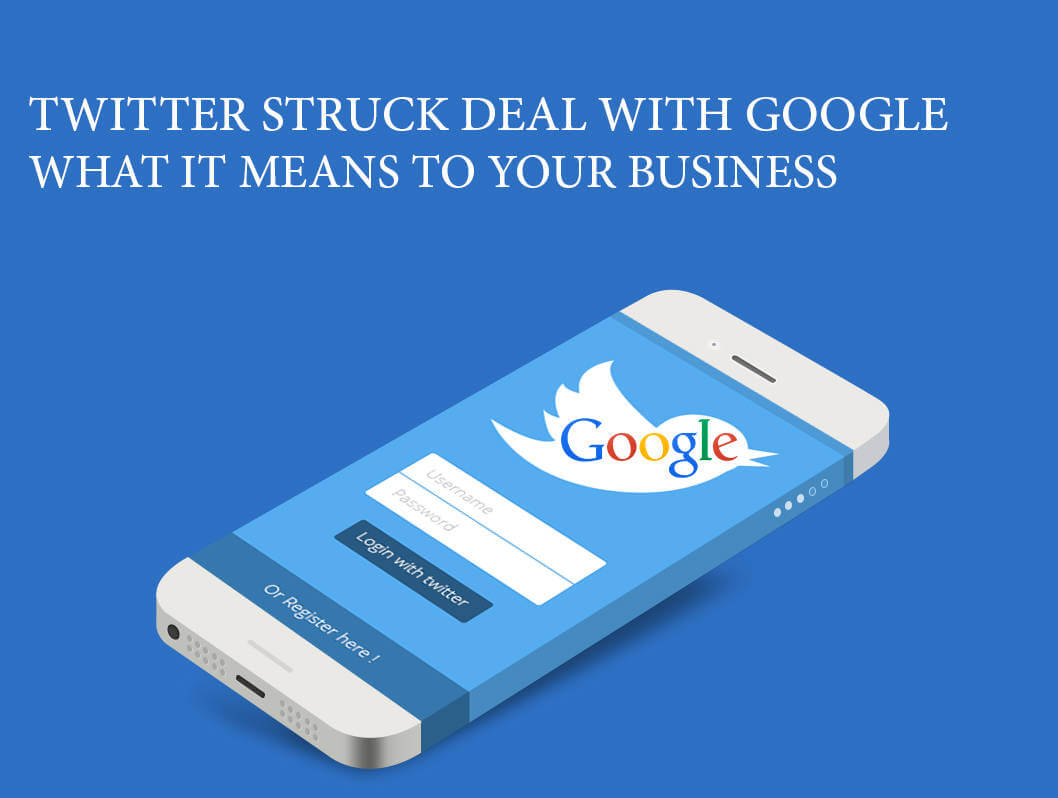What Twitter and Google Agreement Means to Marketers and Your Business

Have you ever wondered what can proceed from the combination of the biggest search engine in the Internet and one of the most powerful social media platform? Now you have the chance to find out. As Twitter Inc. struck a deal with Google Inc., now public tweets will be searchable through the Google search engine. What does it mean for both companies? What can social media users expect? And finally how does it influence marketers? Read on to find out!
According to a report from Bloomberg, in the first half of 2015, all 140-character Twitter public updates will appear in Google’s search results once they’re posted. Twitter is giving Google access to the entire stream of data posted and shared by its 284 million users. The deal between the two giants is beneficial for both Twitter and Google.
Benefits for Twitter
First of all, Twitter will enhance its market’s position against the biggest opponent – Facebook. When the deal comes into effect, users will find Google search results in the form of tweets more often. It will bring more traffic on the platform in the case of existing users, but also will encourage non-users to sign up for the service. Consequently, Twitter will gain ground in communities that it has not been popular before and this will help the company to diversify its advertising products and find more ways to monetize syndicated content.
Benefits for Google
Google+ was created to compete with platforms like Facebook or Twitter. However, it didn’t catch on and was not as successful as the founders had expected. One of its core function was to efficiently learn users’ behavior online basing on his or her activity on the social media platform and then to adjust search results more precisely to the profile. Users were not active on Google+ though and their presence on the platform did not affect search results significantly. With the access to half million tweets daily, Google will drastically increase the amount of content that can be presented to its users and monetized as well. With an insight into public updates on Twitter, the company will be able to personalize search results more accurately.
Gain for users
As I mentioned in the previous section, the access to the Twitter’s stream of data will unable Google for more personalized results in the search engine. Therefore, users will be given even more accurate and relevant results for their queries. Consequently, the number of unwanted and unmatched ads will dwindle. Hopefully.
What Should Marketers Expect?
Gain for both corporations and for users is undeniable. But what does the deal mean for the marketers? Even though, details of the deal have not been revealed yet, we can assume potential outcomes for professionals. Both Twitter and Google are effective advertising tools that help to reach to potential and existing clients, so their common agreement augurs well for the future of advertising.
Basing on the given information, the most obvious effect is that brands will gain wider audience to reach. If the agreement is supposed to bring more traffic to Twitter and engage non-users to join the community, it is clear that the platform will gain in popularity. Consequently, it creates a huge opportunity to extend the reach of brands to a much larger audience.
What is more, it will work the other way around as well. We can assume that the agreement will affect positioning and our content marketing efforts on Twitter will transfer into better visibility in Google search results. It would create a great potential for marketers to increase content quality and in result to give more value to audience.
For the time being, we can mostly speculate about details, but it is clear that brands can leverage on the new partnership. If you want to fully benefit from it, post unique and valuable content on Twitter more frequently.
The other side of the coin
There is no doubt, that the agreement is a good thing and gives huge opportunities for the parties, Internet users and marketers. However, there is a bunch of existing Twitter users who express their concern about it, as they do not want their tweets to be visible in search results.
Will the agreement result in cluttering our search with unwanted data? What are your thoughts and expectations? Leave us a comment!






![Top Twitter analytics tools [2022 update]](https://brand24.com/blog/wp-content/uploads/2018/09/twitter_analytics_tools-640x300.jpg)